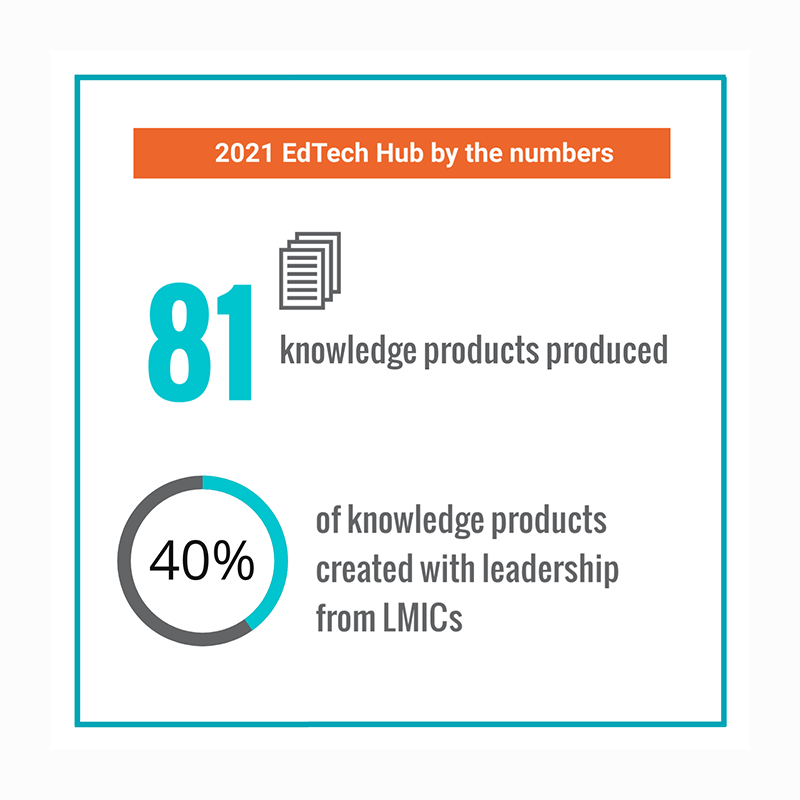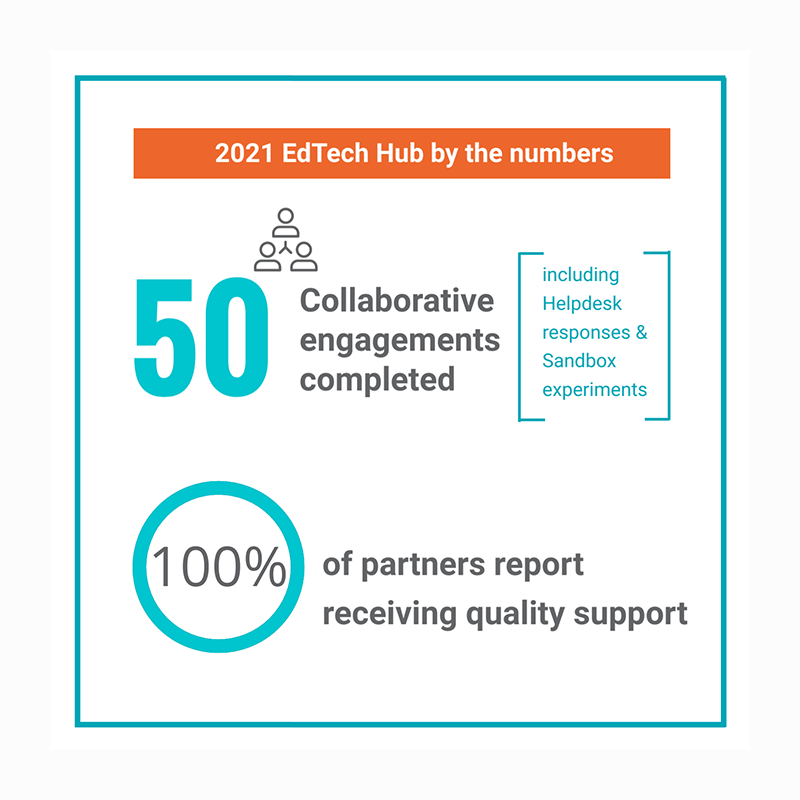Improving education with EdTech evidence
We are in a global learning crisis. Prior to the pandemic, 90% of children in low-income countries could not read a basic text by age 10. Now, 1.5 billion children have experienced COVID-19-related disruptions and the learning crisis has been further exacerbated.
Education technology has potential to transform teaching and accelerate learning. But education policymakers and other decision-makers face overwhelming choices of technology solutions and how to implement them — and they are often unclear about what works and what doesn’t. They need advice on how to adapt and scale solutions.
R4D and its partners are addressing this knowledge gap through EdTech Hub — a global initiative that supports education leaders to make informed decisions about technology in education. It does this by combining rigorous research, iterative “sandbox” testing of solutions, and by providing on-demand technical assistance to country partners.
Demand-led, high impact research
In partnership with researchers around the world, including many in low- and middle-income countries, EdTech Hub has developed eight Rapid Evidence Reviews to support decision-makers with COVID-related school closures.
EdTech Hub also funded small-scale research grants on 10 topics including radio-based learning with girls in rural Kenya, remote teacher training and data systems in Sierra Leone, tech use to increase participation in Pakistan, and the use of text-message nudges to influence caregiver behavior in Ghana. Findings are already being used by governments in their ongoing response to COVID.
In 2022, EdTech Hub launched a £5.3 million-research portfolio — the single largest primary research investment on education technology in low- and middle-income countries to date. The portfolio of 13 studies will explore a range of issues and will be conducted in the EdTech Hub focus countries of Bangladesh, Ghana, Kenya, Pakistan, Sierra Leone and Tanzania.

Applied evidence: Sandboxes
It’s not enough to know “what” works, it’s also important to figure out “how” to make it work. EdTech Hub supports policymakers and practitioners as they adapt and test evidence-based approaches through “sandboxes”— providing essential support in the form of innovation coaching, open-source experimentation tools, and access to experts and funding to conduct real-world testing.
In Malawi, EdTech Hub conducted a sandbox with partner onebillion to test different approaches for incorporating personalized learning tablets into classroom and at-home learning. And, in Tanzania, EdTech Hub is supporting several government partners to design a new, tech-enabled and school-based national professional development program for teachers, testing assumptions about the design and usability of a learning management system. This sandbox, which focuses on how to ensure feasibility at scale, complements an associated large research study that will assess how well it works.
EdTech Hub has completed six sandboxes and the approach was so useful to partners, five of which reported that they will continue using the sandbox tools and methods independently — which is by design: EdTech Hub intentionally designs sandbox engagements to strengthen iterative testing-learning capacities among its partners.

On-demand support: The EdTech Hub Helpdesk
Another challenge decision-makers grapple with relates to speed: how can they quickly identify and tap relevant expertise to help them digest and apply evidence. To address this, EdTech Hub launched a dedicated Helpdesk in April 2020.
The EdTech Helpdesk is a rapid response service that provides on-demand evidence-based advice to inform how education technology is used in education policies and programs. The Helpdesk primarily supports development agencies who work in close collaboration with governments and ministries of education and submit requests on a range of topics linked to large-scale education programming and policymaking. They hear back from the Helpdesk within 24 hours and receive a rapid-turnaround customized response, to match the urgency of their need for advice. The Helpdesk is staffed by a dedicated core team and a specialist network of over 40 consultants with specific topic area and geographic expertise who provide high quality, relevant responses possible in a flexible, just-in-time way.
The EdTech Hub Helpdesk has been a great success, receiving over 114 requests from nearly 54 countries. The Helpdesk has also received positive feedback from the FCDO headquarters and country teams using it to inform policy and programming.
Thank you so much for taking the time to respond so rapidly and helpfully. The key messages are spot-on and will support our conversations with the Ministry of Education.” —EdTech Hub Helpdesk User
The goals of EdTech Hub are ambitious. We envision a world where decision-makers will demand and have access to much-needed evidence, where effective, equitable, and affordable EdTech solutions will be scaled, and ultimately where learning outcomes for all children in low- and middle-income countries will improve. Two years after launching, EdTech Hub is already contributing to the field in meaningful ways and seeing a growing demand for its services — but there’s still much more to do.
EdTech Hub is supported by the U.K. Foreign, Commonwealth and Development Office (FCDO), the Bill & Melinda Gates Foundation, World Bank and UNICEF.













